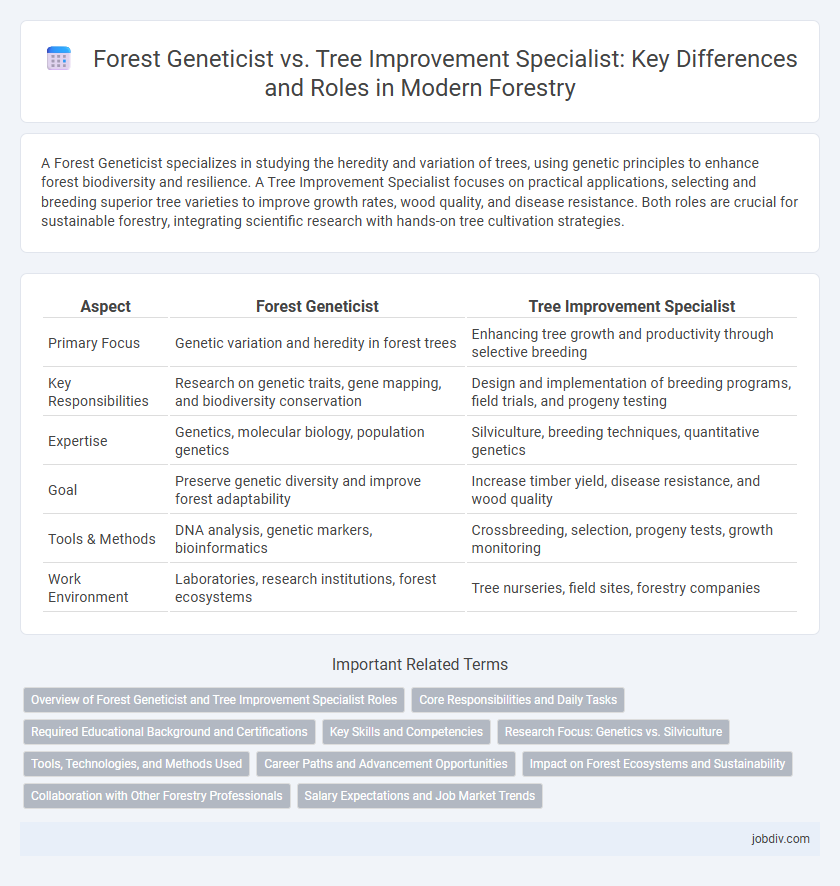A Forest Geneticist specializes in studying the heredity and variation of trees, using genetic principles to enhance forest biodiversity and resilience. A Tree Improvement Specialist focuses on practical applications, selecting and breeding superior tree varieties to improve growth rates, wood quality, and disease resistance. Both roles are crucial for sustainable forestry, integrating scientific research with hands-on tree cultivation strategies.
Table of Comparison
| Aspect | Forest Geneticist | Tree Improvement Specialist |
|---|---|---|
| Primary Focus | Genetic variation and heredity in forest trees | Enhancing tree growth and productivity through selective breeding |
| Key Responsibilities | Research on genetic traits, gene mapping, and biodiversity conservation | Design and implementation of breeding programs, field trials, and progeny testing |
| Expertise | Genetics, molecular biology, population genetics | Silviculture, breeding techniques, quantitative genetics |
| Goal | Preserve genetic diversity and improve forest adaptability | Increase timber yield, disease resistance, and wood quality |
| Tools & Methods | DNA analysis, genetic markers, bioinformatics | Crossbreeding, selection, progeny tests, growth monitoring |
| Work Environment | Laboratories, research institutions, forest ecosystems | Tree nurseries, field sites, forestry companies |
Overview of Forest Geneticist and Tree Improvement Specialist Roles
Forest Geneticists analyze tree population genetics to enhance traits such as growth rate, disease resistance, and wood quality through advanced genetic research. Tree Improvement Specialists apply this genetic knowledge practically by developing breeding programs and managing seed orchards to produce superior tree stock for reforestation and commercial forestry. Both roles contribute to sustainable forest management by optimizing tree characteristics for ecological resilience and economic value.
Core Responsibilities and Daily Tasks
Forest Geneticists analyze tree populations to identify genetic traits that enhance growth, disease resistance, and environmental adaptability, using molecular markers and breeding techniques to develop superior tree varieties. Tree Improvement Specialists implement genetic research findings by managing seed orchards, conducting progeny tests, and optimizing silvicultural practices to increase timber yield and quality. Both roles collaborate closely to ensure sustainable forest management through improved genetic resources and practical application of breeding programs.
Required Educational Background and Certifications
Forest geneticists generally require a minimum of a bachelor's degree in forestry, genetics, or biological sciences, with many positions preferring a master's or Ph.D. focused on forest genetics or molecular biology to analyze genetic variation in tree populations. Tree improvement specialists typically hold degrees in forestry, horticulture, or plant sciences, often supplemented by certifications such as the Society of American Foresters (SAF) Certified Forester credential, emphasizing practical skills in breeding, silviculture, and seed orchard management. Both roles benefit from strong knowledge of quantitative genetics and biotechnology, but forest geneticists have a stronger emphasis on research and genetic analysis, while tree improvement specialists focus on applied breeding techniques and operational implementation.
Key Skills and Competencies
Forest Geneticists possess advanced expertise in population genetics, molecular biology, and quantitative analysis to enhance tree breeding programs and ensure genetic diversity conservation. Tree Improvement Specialists focus on silvicultural techniques, growth modeling, and provenance trials to optimize tree selection and forest productivity. Both roles require strong skills in data analysis, ecological principles, and field experimentation to improve forest resilience and timber quality.
Research Focus: Genetics vs. Silviculture
Forest geneticists primarily focus on understanding the genetic variation, heredity, and gene expression in tree populations to enhance traits such as disease resistance and growth rates. Tree improvement specialists concentrate on silvicultural practices that optimize tree growth and yield, applying genetic information to breeding programs and field management. Both roles collaborate to integrate genetic research with practical silviculture to improve forest productivity and resilience.
Tools, Technologies, and Methods Used
Forest Geneticists utilize molecular markers, DNA sequencing, and bioinformatics tools to analyze genetic diversity and identify desirable traits for breeding programs. Tree Improvement Specialists employ quantitative genetics, provenance testing, and clonal trials combined with growth modeling software and remote sensing technologies to enhance tree performance and adaptability. Both roles integrate advanced phenotyping techniques and geographic information systems (GIS) to optimize forest productivity and resilience.
Career Paths and Advancement Opportunities
Forest geneticists specialize in the study of tree genetics and breeding to enhance forest resilience and productivity, often working in research institutions or government agencies. Tree improvement specialists concentrate on applying genetic knowledge to develop superior tree varieties through practical silvicultural techniques, with career advancement often linked to project management or leadership roles within forestry companies. Both career paths offer opportunities for advancement through advanced education, specialization in biotechnology, and contributions to sustainable forest management programs.
Impact on Forest Ecosystems and Sustainability
Forest geneticists study the genetic diversity and adaptability of tree populations to enhance resilience against pests, diseases, and climate change, directly supporting ecosystem sustainability. Tree improvement specialists apply selective breeding and biotechnological methods to develop superior tree varieties with optimized growth and wood quality, which can increase forest productivity but may impact genetic diversity if not managed carefully. Both roles are critical for maintaining healthy forest ecosystems, balancing genetic conservation with the demand for improved forest resources in sustainable forestry practices.
Collaboration with Other Forestry Professionals
Forest geneticists collaborate closely with tree improvement specialists to enhance tree breeding programs by integrating genetic data with silvicultural practices. This partnership facilitates the development of superior tree genotypes that improve forest resilience, productivity, and adaptation to climate change. Working alongside ecologists, pathologists, and forest managers, both specialists contribute to comprehensive forest health and sustainability strategies.
Salary Expectations and Job Market Trends
Forest Geneticists typically command higher salary expectations, averaging $70,000 to $90,000 annually, due to their specialized expertise in genetic variation and breeding techniques. Tree Improvement Specialists, focusing on silvicultural practices and growth modeling, usually earn between $60,000 and $80,000, reflecting strong demand in commercial forestry and conservation projects. Job market trends indicate growing opportunities for both roles driven by climate change adaptation efforts and sustainable forest management initiatives.
Forest Geneticist vs Tree Improvement Specialist Infographic

 jobdiv.com
jobdiv.com